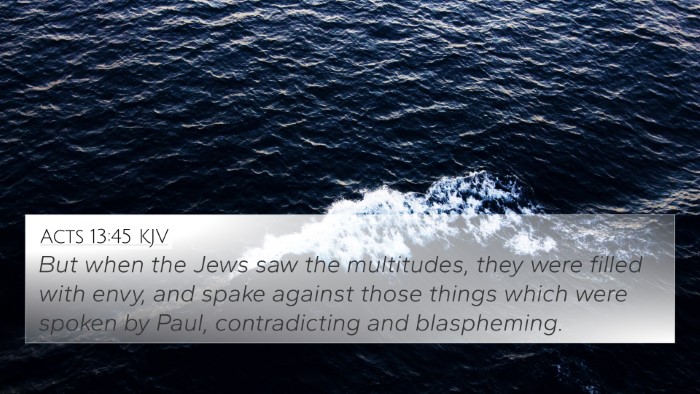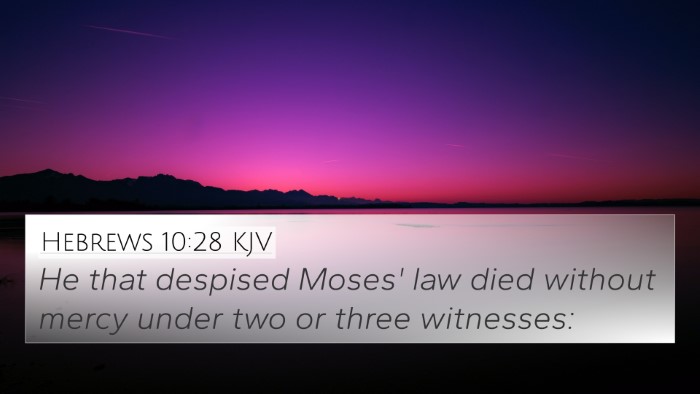Understanding Acts 26:11
Acts 26:11 details the fervent pursuit of Paul, then known as Saul, against the early followers of Christ. His zeal and dedication to preserving the Jewish traditions led him to persecute Christians, often forcing them to blaspheme. This verse provides crucial insight into the transformation that he experienced on the road to Damascus, as well as the subsequent commission he received from Jesus.
Commentary Insights
Matthew Henry's Commentary:
Henry emphasizes the extreme measures Saul took against Christians, highlighting his misguided devotion. His actions, driven by a misunderstanding of true righteousness, serve as a warning against fervor without understanding. Furthermore, Henry notes that Paul’s confession of his violent past is important for illustrating the magnitude of God’s grace in transformation.
Albert Barnes’ Notes:
Barnes discusses the context where Saul, consumed with passion, sought to ensure that all Christians renounced their faith. He observes that this illustrates a broader theme of the conflict between grace and law, showing that even the greatest of sinners can be redeemed. Barnes connects Paul’s conversion to themes of repentance and transformative faith.
Adam Clarke’s Commentary:
Clarke elaborates on the psychological state of Saul, rooted in his dedication to Jewish law, which led to his hostility towards Christians. It's worth noting that Clarke points out the prophetic indications of Paul's future as a witness, suggesting that his intense experiences were preparatory for his divinely appointed role. The overall transformation narrative emphasizes God's ability to change hearts and purposes.
Bible Verse Cross-References
- Acts 22:4-5: Paul recounts his previous life of persecution, helping to establish his dramatic transformation.
- Acts 9:1-2: Describes Saul's initial zeal in persecuting the church, highlighting the connection between this verse and his violent past.
- 1 Timothy 1:13-14: Paul reflects on his past, showcasing the mercy of God that transforms even the worst offenders.
- Philippians 3:6: Paul speaks of his past zeal as a Pharisee, which further illustrates his mindset before conversion.
- Romans 5:20: Explores the concept of grace in relation to sin, aligning with Paul's experience of redemption.
- 2 Corinthians 5:17: Highlights the new creation concept, integral to understanding Paul’s transformation.
- Luke 23:34: Jesus' words on the cross reflecting forgiveness resonate with the theme of Saul's later mission of spreading grace.
- Acts 26:9: Provides further insight into Saul's initial attitude toward Christianity and helps frame his later defense.
- Matthew 12:30: This verse on division can be linked to Saul’s role prior to his conversion and the subsequent division he witnessed.
- Galatians 1:13-14: Paul recounts his zeal for Judaism, linking earlier life experiences that culminated in Acts 26:11.
Thematic Bible Verse Connections
The verse serves as a pivotal point in linking various themes across Biblical texts, such as:
- Transformation: Found throughout the New Testament, especially in Paul's letters.
- Grace vs. Legalism: The conflict often discussed in Pauline epistles re-emerges in Paul’s own narrative.
- Divine Sovereignty: The overarching theme of God's control in human affairs as illustrated in Paul's life trajectory.
- Persecution of Believers: Seen in various scriptures detailing both the Old and New Testament believers’ trials.
Cross-Referencing Biblical Texts
When studying Acts 26:11, it's clear that tools for Bible cross-referencing are invaluable. By examining how scripture dialogues with itself, one can glean deeper understandings of themes like redemption and divine purpose.
- Identifying Connections: This verse exemplifies connections between the Old Testament's prophetic nature and the New Testament's fulfillment in Christ.
- Bible Concordance: Use guides to draw parallels between this verse and others, enriching study and comprehension.
In conclusion, Acts 26:11 is a rich verse that offers profound implications for understanding the nature of redemption, the human condition, and God's transformative power. It invites believers to reflect on their paths and the potential for divine interruption in any life.


















